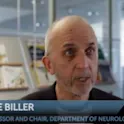
Life sciences
06 Apr 2016
Study raises online golf tutorials to above par
By Tania FitzGeorge-Balfour, Science Writer The internet is overflowing with online tutorials dedicated to improving your game of golf and other motor skills. A new study in Frontiers in Psychology has shown that straightforward changes to the way these tutorials are presented can have a measurable difference in the performance of the student. “Lots of research has shown that observing both novice and expert golfers online will help you to learn a new golf shot. However, our latest findings show that it is important to know the level of expertise you are observing before you watch the tutorial,” said Luc Proteau, a Professor at the University of Montreal, co-author of this new study. Knowing students of online tutorials benefit from watching all levels of expertise, Luc Proteau and co-author Mathieu Andrieux set out to understand whether it was better to know beforehand the skill level of the demonstration, or if students should be first left to evaluate the performance themselves. Arguments were put forward to support both approaches – prior knowledge of the skill level may enable a student to decide whether to imitate or detect errors/weakness. Alternatively, assessing the skill of a performer while watching them may activate more […]













